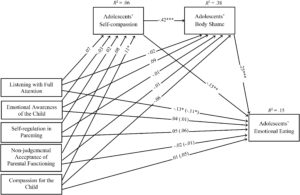A Healthy Lifestyle is Promoted by Mindfulness
By John M. de Castro, Ph.D.
“Let’s say you find yourself eating a bag of chips in front of the TV — your evening pattern. Being mindful can help you break free from the autopilot trance and take a moment to make a different choice. You could trade the chips for carrots, or decide to skip TV and take a walk around the block instead.” – WebMD
We tend to think that illness is produced by physical causes, disease, injury, viruses, bacteria, etc. But many health problems are behavioral problems or have their origins in maladaptive behavior. This is evident in car accident injuries that are frequently due to behaviors, such as texting while driving, driving too fast or aggressively, or driving drunk. Other problematic behaviors are cigarette smoking, alcoholism, drug use, or unprotected sex. Problems can also be produced by lack of appropriate behavior such as sedentary lifestyle, not eating a healthy diet, not getting sufficient sleep or rest, or failing to take medications according to the physician’s orders. Additionally, behavioral issues can be subtle contributors to disease such as denying a problem and failing to see a physician timely or not washing hands. In fact, many modern health issues, costing the individual or society billions of dollars each year, and reducing longevity, are largely preventable. Hence, promoting healthy behaviors and eliminating unhealthy ones has the potential to markedly improve health.
Mindfulness training has been shown to promote health and improve illness. It is well established that if patterns and habits of healthy behaviors can be promoted, ill health can be prevented. There is, however, little research on the effects of mindfulness practice on promotion healthy behaviors.
In today’s Research News article “.” (See summary below or view the full text of the study at: https://www.ncbi.nlm.nih.gov/pmc/articles/PMC7468720/) Soriano-Ayala and colleagues recruited college students and randomly assigned them to a wait-list control group or to receive 7 weekly 2-hour sessions of mindfulness training. Mindfulness training involved breath and body scan meditations, and training on letting thoughts flow. Before and after training they completed measures of lifestyle choices, including alcohol consumption, cannabis consumption, tobacco use, eating habits, and rest habits. They were also measured for eating consumption patterns and eating responses to negative emotions.
They found that in comparison to the wait-list control group, the group that received mindfulness training had significant improvements in healthy lifestyles, including eating a balanced diet, rest habits, and alcohol consumption. It is, however, not possible to determine from the current study how lasting these changes may be. The authors did not state how long they waited before the post-test. So, it is not clear that there was sufficient time for the mindfulness training to register an alteration of the lifestyle behaviors. In addition, the control condition was a passive wait-list control. This leave open the possibility of confound variables like placebo, attentional, or experimenter bias effects being responsible for the observed differences. Nevertheless, these improved lifestyle behaviors would predict better future health and better college performance for the students after mindfulness training.
So, promote a healthy lifestyle with mindfulness.
“While meditation can help you manage stress, sleep well and feel better, it shouldn’t replace lifestyle changes like eating healthier, managing your weight, and getting regular physical activity. It’s also not a substitute for medication or medical treatment your doctor may have prescribed.” – Heart.org
CMCS – Center for Mindfulness and Contemplative Studies
This and other Contemplative Studies posts are also available on Google+ https://plus.google.com/106784388191201299496/posts and on Twitter @MindfulResearch
Study Summary
Encarnación Soriano-Ayala, Alberto Amutio, Clemente Franco, Israel Mañas. Promoting a Healthy Lifestyle through Mindfulness in University Students: A Randomized Controlled Trial. Nutrients. 2020 Aug; 12(8): 2450. Published online 2020 Aug 14. doi: 10.3390/nu12082450
Abstract
The present study explored the effects of a second-generation mindfulness-based intervention known as flow meditation (Meditación-Fluir) in the improvement of healthy life behaviors. A sample of university students (n = 51) in Spain were randomly assigned to a seven-week mindfulness treatment or a waiting list control group. Results showed that compared to the control group, individuals in the mindfulness group demonstrated significant improvements across all outcome measures including healthy eating habits (balanced diet, intake rate, snacking between meals, decrease in consumption by negative emotional states, increased consumption by negative emotional states, amount of consumption, meal times, consumption of low-fat products), tobacco, alcohol, and cannabis consumption, and resting habits. There were differences between males and females in some of these variables and a better effect of the treatment was evident in the females of the experimental group when compared to the males. The flow meditation program shows promise for fostering a healthy lifestyle, thus decreasing behaviors related to maladaptive eating, tobacco, alcohol, and cannabis consumption as well as negative rest habits in university students. This mindfulness program could significantly contribute to the treatment of eating disorders and addictions, wherein negative emotional states and impulsivity are central features of the condition.
https://www.ncbi.nlm.nih.gov/pmc/articles/PMC7468720/









